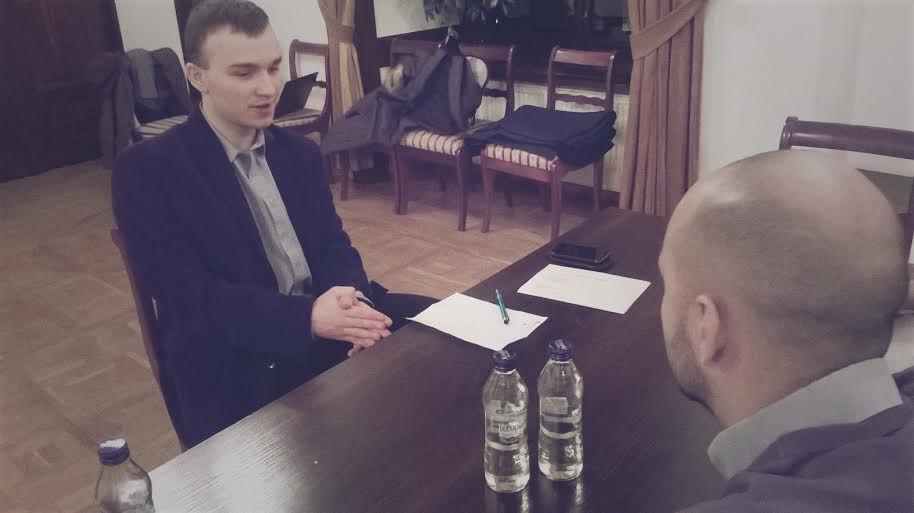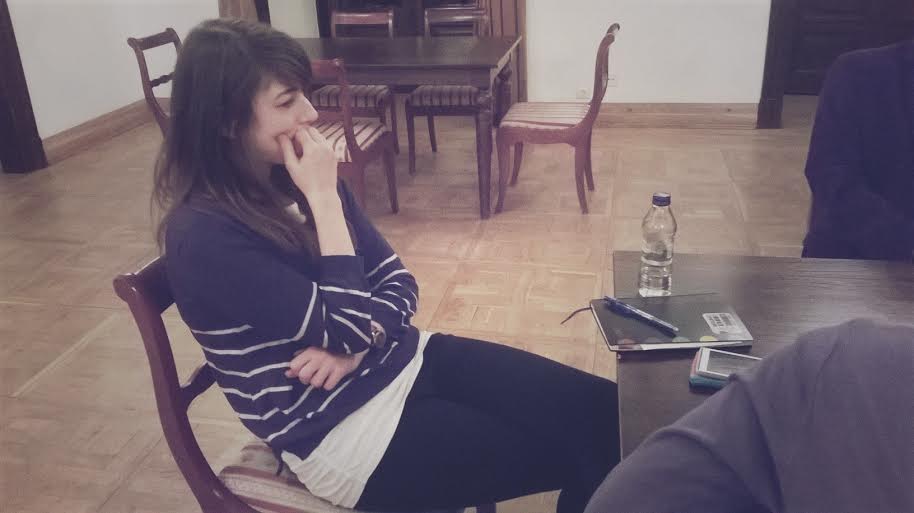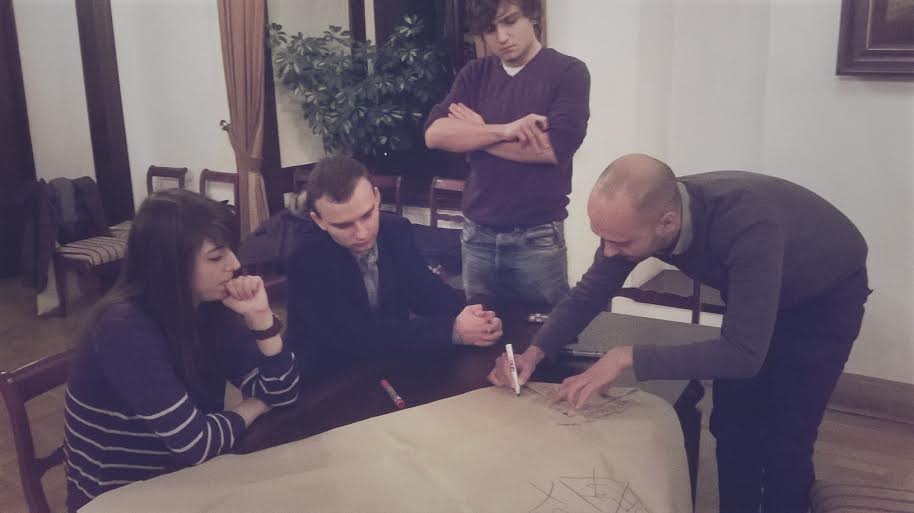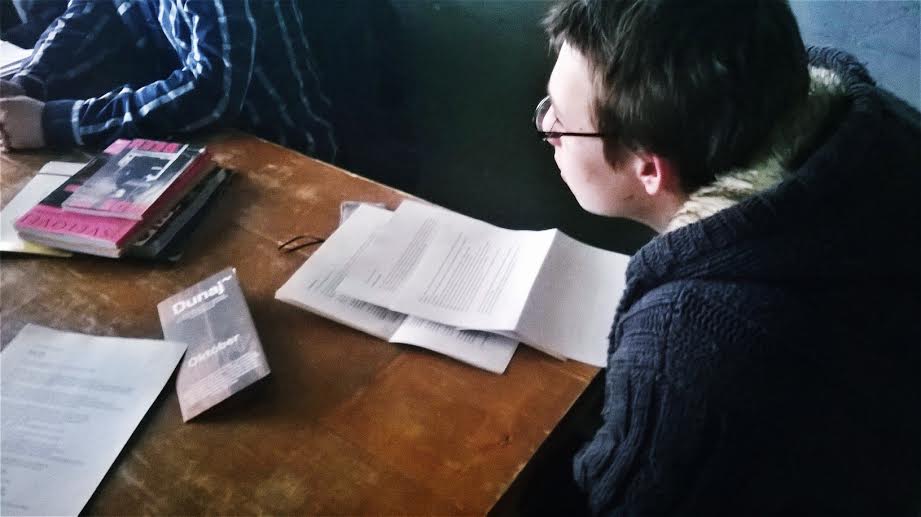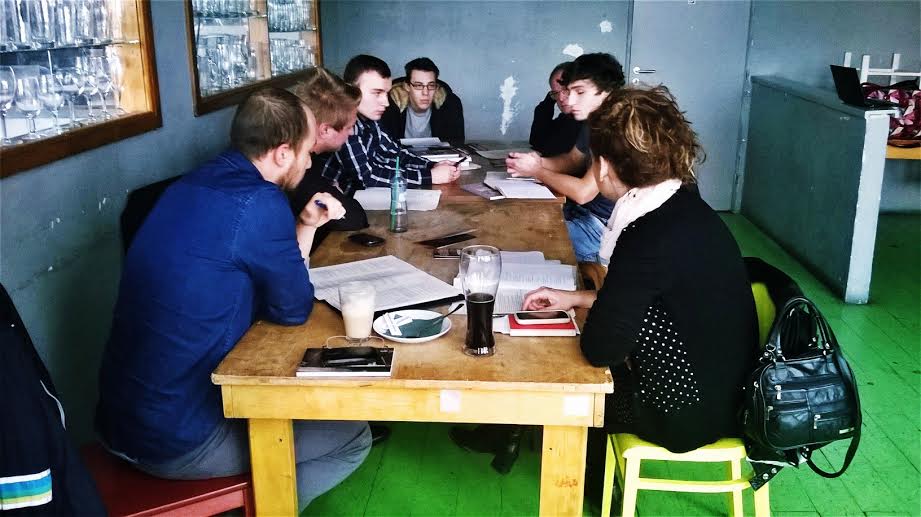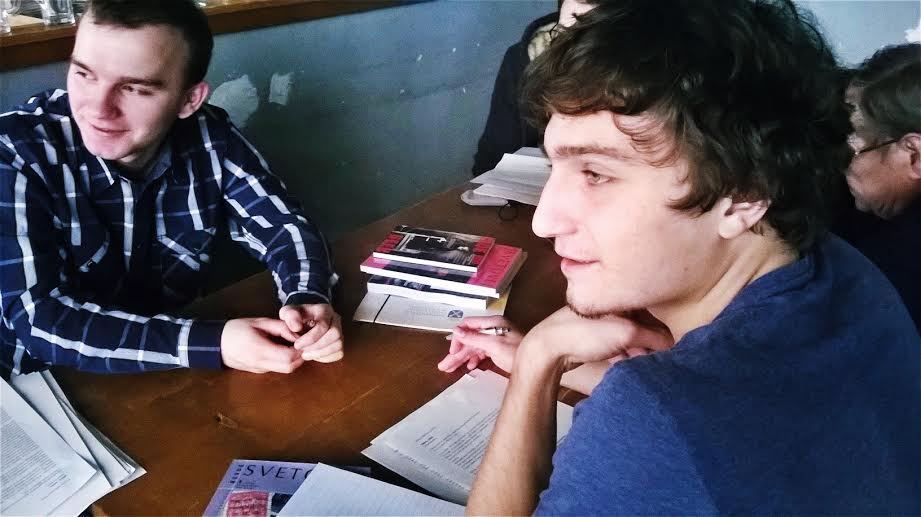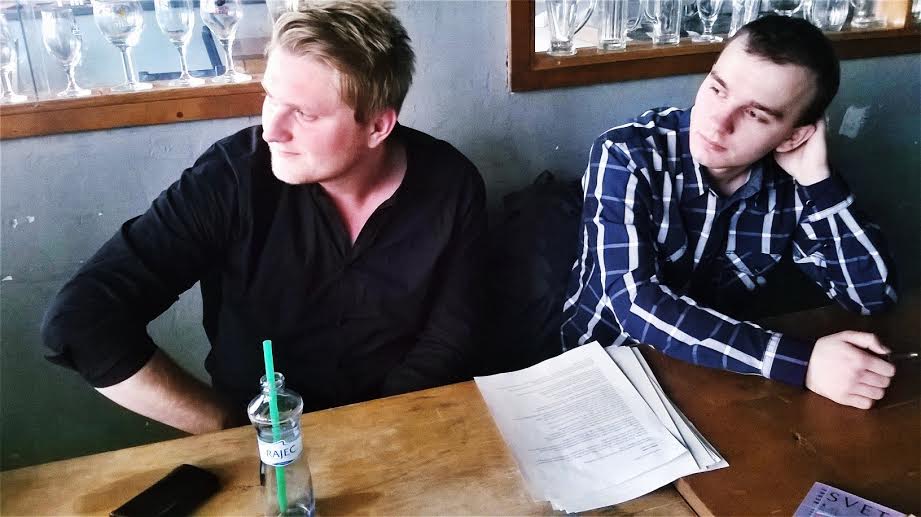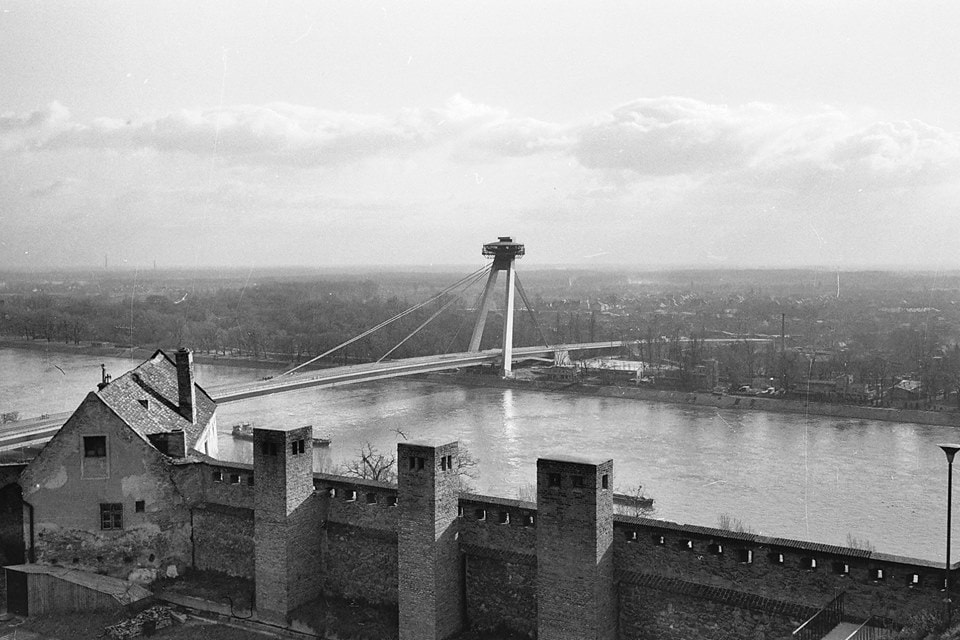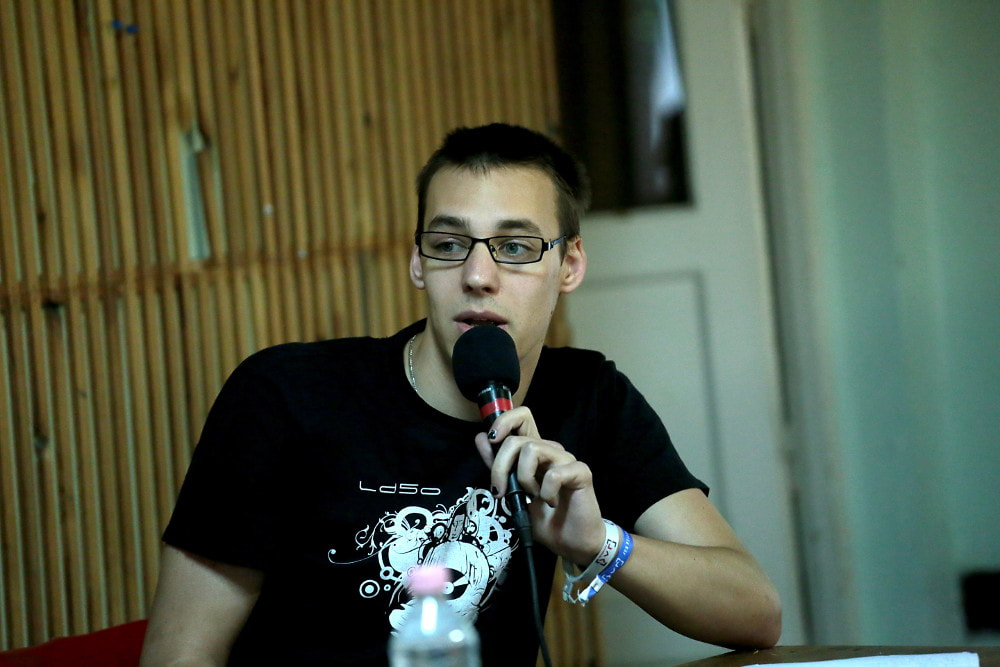|
The last edition of ”Children of the Transition” project was, finally, organized in my city – in Cracow. It was great pleasure to meet the young writers, critics and poets in one of the oldest Polish cities, where the atmosphere of fine arts and all other kinds of culture is alive as in any place of the country.
The event, organized by Jozsef Attila Circle Literary Association of Young Hungarian Writers, was so far the special one for me. Not only because of the place of the workshops, but foremost because of the relations and friendship with other participants, established during the previous editions. The workshops, focused on avant-garde, conducted by Sabina Misiarz-Filipek from Poland and Akos Fodor Kele from Hungary, were absolutely professionally conducted, what enabled to organize very interesting and constructive discussion between all the participants. The one iniciative, which especially is to hold in my memory, was to create the graphics based on similarities and differences of avant-garde of all the Visegrad Group’s countries. From my point of view, it was really successful, cause not only did we manage to gain the consensus, but we also illustrated it on the poster. Summing up the “Children of the transition” edition in Cracow, I can honestly say that is the huge privilege to be in the team, and to contribute to the project organized by JAK. I hope there will be more occasion to meet again with these amazing and inspiring people, and to discuss with them crucial issues connecting our countries in the Visegrad Group.
1 Comment
The next round of the Children of the Transition session is held in Cracow. I’m the only one who seems to be the „official newbie” – I am charged to replace Bence and Anna, who both couldn’t manage to take part in the workshops.
After our arrival, we don’t have much time to take a nap: up for Cracow! I am introduced to Wojciech and Stepan. I’m embarrassed but it’s getting better after some cigarettes with the guys. To sum up briefly our night, I must highlight some words: (hilarious Polish) cuisine, (freaking) COLD, tower, (another) tower, pub, taxi, (oh-my-god-I-love-my) bed. Next day, Stepan, Feri, Ákos and I meet in Villa Decius to discuss our attitude towards the transition, poetry and the literary situation of our country. It’s Sabina Misiarz-Filipek who moderates the conversation. She has interesting questions and she leads the interview in a very professional way. I really enjoy the three-hour long talk. It turns my brain on about topics which I’ve never wondered deeply before like: would I choose poetry as a full-time job if I lived in a state where literature is well-paid? Or: why the hell there is no author or poet in Hungary who would stand out proudly and write down that he or she is homosexual? After lunch, we come together with Wojciech for the second workshop (Feri is the one again who’s typing on his laptop like a moustached spy). Our task is to talk about the avant-garde and neo-avantgarde movement in our country. Despite that I really tried to get some information about the weak avant-garde lyrical tradition of Hungary, I feel like I have no idea how to intervene in the conversation. But it’s okay, fortunately, some names pop up in my mind and I know the characteristics of the movement so it helps me to fit in. The rest of the time goes by sketching the common features and the differences among Polish, Czech and Hungarian avant-garde before and after the transition. At the end of the day, we go to Kazimierz, the Jewish and also the party district of Cracow. We get in Alchimia, Feri’s favourite place, a fully candled ruin-bar-like pub. I realize that I love Polish people and Polish aperitifs. I’m looking forward to see these guys in Budapest. I had great time in Cracow but I feel like I didn’t have enough opportunity to (get sufficiently relaxed to) have good talks with them. But Budapest is my ground so I will be super-duper. Réka Borda It was a great pleasure and honour we could spend these days in such a lovely residence as Villa Decius in Kraków. It gave me a proper frame of mind for the first workshop-session conducted by the kind and very good questioner Sabina Misiarz-Filipek. We were discussing about how the sociological factor of literary field had been changed after the transition in the 90’s and after the millennium in each nations (polish, czech and hungarian).
We did it as the apropos of a new anthology –of treatise on the connection of polish literary field, criticism and sociological processions– edited by her. She gave us the very same questions had been analysed in this book: relation of money and profession, depreciation of prizes and political engagement, political movements in literature, changing book market etc. It was pretty clear that we are all suffer from quite similar symptoms, and the causes trace back to the period of transition and the post-communist form of capitalism. The next session was about the participants’ own picture of the V4’s history of literary avant-garde. It turned out Hungary and Poland have a lot of correspondence in the features of our avant-garde movements, such as social sensibility and a desire of establishing of a whole new concept of reality and aesthetics, and later it became an anti-culture of the communism, while Czecho-Slovakia and Czech Republic experienced a different form of avant-garde, and it has a completely different contemporary state of the this legacy. So it looked like the differences didn’t exclusively related to the transition but the similarities did. It is very fascinating and it would need a further research and analysis in the context of our personal heritage as writers and our own features of aesthetics. CHILDREN OF THE TRANSITION – BRATISLAVA WORKSHOP (14-15. October 2014, KC Dunaj, Bratislava) Getting serious Last night Bartosz happened to be in Bratislava so we met up with him. When I get home two days later, I see Jan’s check-in from Bratislava on Facebook. I guess it’s a city that attracts writers. (Bartosz Marcinkowski, editor of V4 partner New Eastern Europe Journal; Jan Kowalewicz, former participant of the Children of the Transition project, also former V4 literary resident in Bratislava.) After breakfast we make our way to the location of the first workshop. It’s in the old town but the building is ‘70s socialist style. Its greyness, straight edges and cubic shape stands out. The café is in the basement. Peter greets us. (Peter Kerlik, expert from the Slovakian partner institute.) There are three participants: Štěpán from the Czech Republic who I already met in Balatonszemes, Wojciech from Poland, and me. Wojciech is a new member of the group. He is a soon-to-be political journalist. Peter represents Slovakia as the new Slovakian participant can only make it to the second workshop. Last night Bartosz happened to be in Bratislava so we met up with him. When I get home two days later, I see Jan’s check-in from Bratislava on Facebook. I guess it’s a city that attracts writers. (Bartosz Marcinkowski, editor of V4 partner New Eastern Europe Journal; Jan Kowalewicz, former participant of the Children of the Transition project, also former V4 literary resident in Bratislava.) After breakfast we make our way to the location of the first workshop. It’s in the old town but the building is ‘70s socialist style. Its greyness, straight edges and cubic shape stands out. The café is in the basement. Peter greets us. (Peter Kerlik, expert from the Slovakian partner institute.) There are three participants: Štěpán from the Czech Republic who I already met in Balatonszemes, Wojciech from Poland, and me. Wojciech is a new member of the group. He is a soon-to-be political journalist. Peter represents Slovakia as the new Slovakian participant can only make it to the second workshop. Szabolcs leads the first discussion. I can see he’s a bit uncomfortable speaking but he does it well. He hands out Hungarian poems of political matter written throughout the last twenty-five years. His goal is mainly to get non-Hungarians acquainted with contemporary Hungarian literature, but not disregarding the topic of change of regime. Others seem to like the texts: Štěpán quickly translates a short by Kányádi to Czech. I’m glad that this time we have some set material to work with, although I wish someone else from the V4 countries had prepared in such manner. Štěpán said he will do something similar for Prague, so I’m optimistic. Suddenly it’s lunchtime and this interrupts the session. We agree on finishing the topic in the afternoon.
KC Dunaj is amazing. The wall of the stairway is full of poems in various languages (the Hungarian ones reflect the terrible taste of the person who chose them). The bar is clean and well-furnished. Electronic and chill music is playing. You can tell they’ve put effort in it. We meet the new Slovakian participant, Peter W. Balko. He introduces himself as a screenwriter. He’s quite amiable. This session is led by Kinga Tóth. She follows up on the topics she brought up first in Balatonszemes. She brought a few poems written by Márió Z. Nemes to help start the discussion about hierarchy, childhood traumas, folk stories and fairy tales as well as our own writing. The latter is quite awkward; no one seems to enjoy analyzing their own texts, but it’s interesting to see how one manages to do so. After this I became more and more curious about the others’ writings. During the active part we write. I try to come up with a good symbol to show the difference between the two regimes. I feel rather uncomfortable doing this in front of others, but it’s just a 20-minute part of the workshop. We finish by saying it’s basically homework for Prague. I’m glad I will have time. Time is always what I need. Bence Szenderák (Hungary) CHILDREN OF THE TRANSITION – BRATISLAVA WORKSHOP
(14-15. October 2014, KC Dunaj, Bratislava) Next session of the Children of the Transition project was held in the Slovak capital Bratislava. Some participants were known to me from Balaton, some were new for me. I enjoyed Bratislava session very much. Firstly because I got to know new city, so important for cultural history of Slovakia – one of V4 countries. Secondly because workshops were held in more practical way than at Balaton. We read interesting texts from both classical and contemporary mainly Hungarian poets and artists and talked about them lot. Getting to know literature of our region, the Middle Europe, which is today represented with V4 organisation, is in my opinion the essential goal of our project. And that is the very reason why are these workshops so fruitful. The other thing we did was the start of writing our own texts „moderated“ by one of lectors – Kinga Toth. I‘m looking forward to our next session in Prague where we will hopefully hear all of these. Yes. In fact I ended how I wanted to end from the very beginning. I’m looking forward to our next session in Prague! Štěpán Hobza (Czech Republic) (14-15. October 2014, KC Dunaj, Bratislava)
In the middle of October 2014 I had a great pleasure to attend the workshop based on the topic: Children of the Transition. The event, organized by József Attila Circle Literary Association of Young Hungarian Writers was, foremost, a great possibility to exchange the opinions about the transition/transformation of the systems in Visegrad Group’s countries. The discussions were basically referred to the interpretation of the literature in point of view of every participant from a V4 country, but thanks to the opened minds of the workshop’s members there used to be also a lot of references to the psychology, sociology, history and foreign relations as well. One of the most important activities, undertaken by us, and which will be memorable for the very long time, was to make an example of a toy, which would be connected to the past system in our countries. The task helped me really to understand how things are to change and how, in the very common sense of the meaning, did I remember the moments of transition and the very beginning of the post – communist times in my country. Thanks to the excellent organization of the workshop and the whole event in general, as well as the great other participants, I will keep in mind the undertaking made by JAK in Bratislava for a very long time. Wojciech Gil (Poland HILDREN OF THE TRANSITION József Attila Circle Literary Association of Young Hungarian Writers Session No. 2. Bratislava PROJECT A new generation which never lived a day before Central Eastern European transitions is now showing its more important appearance in today’s cultural publicity. This year the main aim of our Association is to expand our traditional Summer Literary Course into an international cultural camp by organising workshops for the youngest literary generation of the V4, and also start to run a series of presentations in the V4 countries, which will end with the publication of a multi-language online brochure. BRATISLAVA WORKSHOP In Bratislava we will continue the work we started in JAK’s Summer Course in Hungary while we will include new participants from the V4 countries. THEME – Political and social opinions in the works of the youngest V4 literary generation – Recommend and make a discussion about a literary work, film or exhibition from each country which represents the Transition period of the country ORGANIZERS Ferenc Czinki writer, critic (H); Szabolcs László writer, editor (H); Kinga Tóth poet, experimental artist (H) PARTICIPANTS Peter W. Balko (SK); Štěpán Hobza (CZ); Bence Szenderák (H); Wojciech Gil (PL) PROGRAMME 14 October 12.00-19.00 Arriving Bratislava Flagship Restaurant (Námestie SNP 8.) 19.00 Dinner 15 October Asociácia organizácií spisovateľov Slovenska main building (Laurinská 2.): 10.00 Lecture + workshop 1. with Szabolcs László 13.00 Lunch KC Dunaj (Nedbalova 3.): 14.00 Workshop 2. (open discussion) with Kinga Tóth 17.00 Sightseeing U Certa Bar (Beblahevo 2.): 19.00 Dinner CONTACT Ferenc Czinki [email protected] 003670/676-8282 It’s difficult. To not taking part of a political movement as an artist. Why should I not take the money from the national found, if I don’t agree with the government’s culture politics? It’s my money. From my taxes too. Why should I think through before I give an interview to a magazine? You shouldn’t – they say – it’s just a wrong feeling. And they may have right. It doesn’t matter that much anymore. And maybe I’m the paranoid, who always fears to join to a political view. But maybe I’m not the only one.
We all borned after a tough political system. But now, I don’t have to care about the way how to publish, the way how to live my life as an author. Can thinking and traveling free, and I got these from my birth. When the others talk about never-published or samizdat literature, I’m wondering abut that I can only hardly imagine these problems in my life. These experiences are getting more far and far from us. I keep this title in my mind: Der Stand der Dinge. Always changes. And it’s not a shame, that I usually even not notice how easy to create something after the transition. It’s not a shame. I guess. I hope. Jószef Attila Kör summer literary camp in Balatonszemes.
Today’s lesson on current writers of Central European region is to deal with reality that they are defacto first generation after transition/falling of Iron curtain. It is very wide topic in my opinion and today, at the workshop the question arose whether literature, or any form of art should be engaged in the politics, or in other words, what should be its relation to politics? If simplified, there could be two approaches: first – rather engaged approach assuming every action taken on the field of literature should be considerd as, at some level – a political engagement. This, amongs all raises questions about forms of financing the creative process and consequences which relate to the situation when art/literature voluntarily (or not) participates in institucializing itself because institution, from its nature cannot exist outside of public sector and therefore gets into direct relations with politics as a souce of power/organisation at some level. Second approach is to consider literature as a form of art completely independent and rather not tied with politics at all. So its role is really percepted only in the terms of aeshetics, which doesn’t necesserily have to meet the values of whole society’s needs and therefore it might be considered less “important” in the optics of service to the public. For myself, more important approach is the second one and I find the aesthetic values above the public interests, even though I am not trying to disregard the opposite. I, as a part of generation which doesn’t have to live in totality, appreciate that art doesn’t need to be tied so much with politics or establishment but I find challenging at the same time that with plural democracy to stay objective and identify the problems within society is not less difficult than in dictatorship. It’s only the first meeting, but I’m already anxious. Everyone sounds professional, and I can’t even collect my thoughts. Let’s try it anyway.
Réka Mán-Várhegyi and Kinga Tóth lead the discussion. They talk first: Réka tells us the plans, Kinga follows up with a few questions she thinks we could discuss. We introduce ourselves, everything feels a bit uncomfortable so far. Right now we are only strangers around the same table hoping to start a conversation about series of events we only heard about, but which changed our lives even before we were born. I can barely say anything about myself, but all the others seem collected. We go through compulsory topics; I feel like we are comparing the habits and ways of the countries, but of course it’s not competitive… I hope, as I later pass some of the others in front of the Trianon Memorial as I’m coming from the market… we’re merely just mentioning things. The main question of the day is: how can a young writer or poet start their literary career in the V4 countries? Is it easier to get into literary circles through other forms of art (Jan started with performance poetry; Kinga with noise music)? How fast can one get published in good periodicals? Is it more difficult for a woman or is that already a thing of the past? Do online magazines have a good reputation or is it a printed publication that counts? Bartosz, as a journalist, explains to us the way of getting into in writing about politics. Suddenly there’s a small halt; the discussion’s been going on for two hours, so the coordinators decide that the last question should be about influences and mentors. I feel that everyone has totally different attitudes, and it shows in the answers as well (is reading good, are closed groups effective, is working on different kinds of text a help, etc.); I suspect fierce argument is on the way. But to be honest, I’m really looking forward to it. Bence Szenderák |

